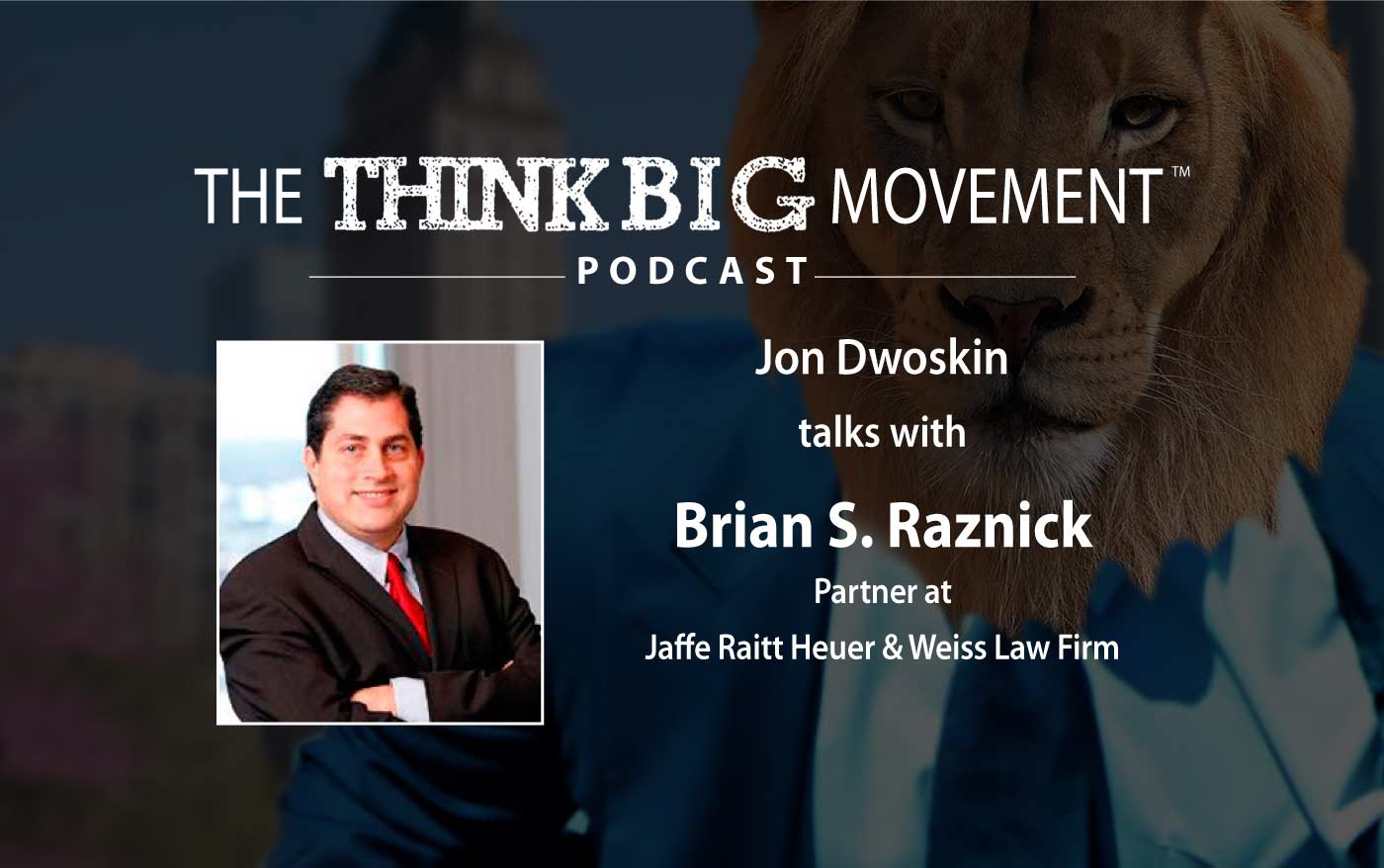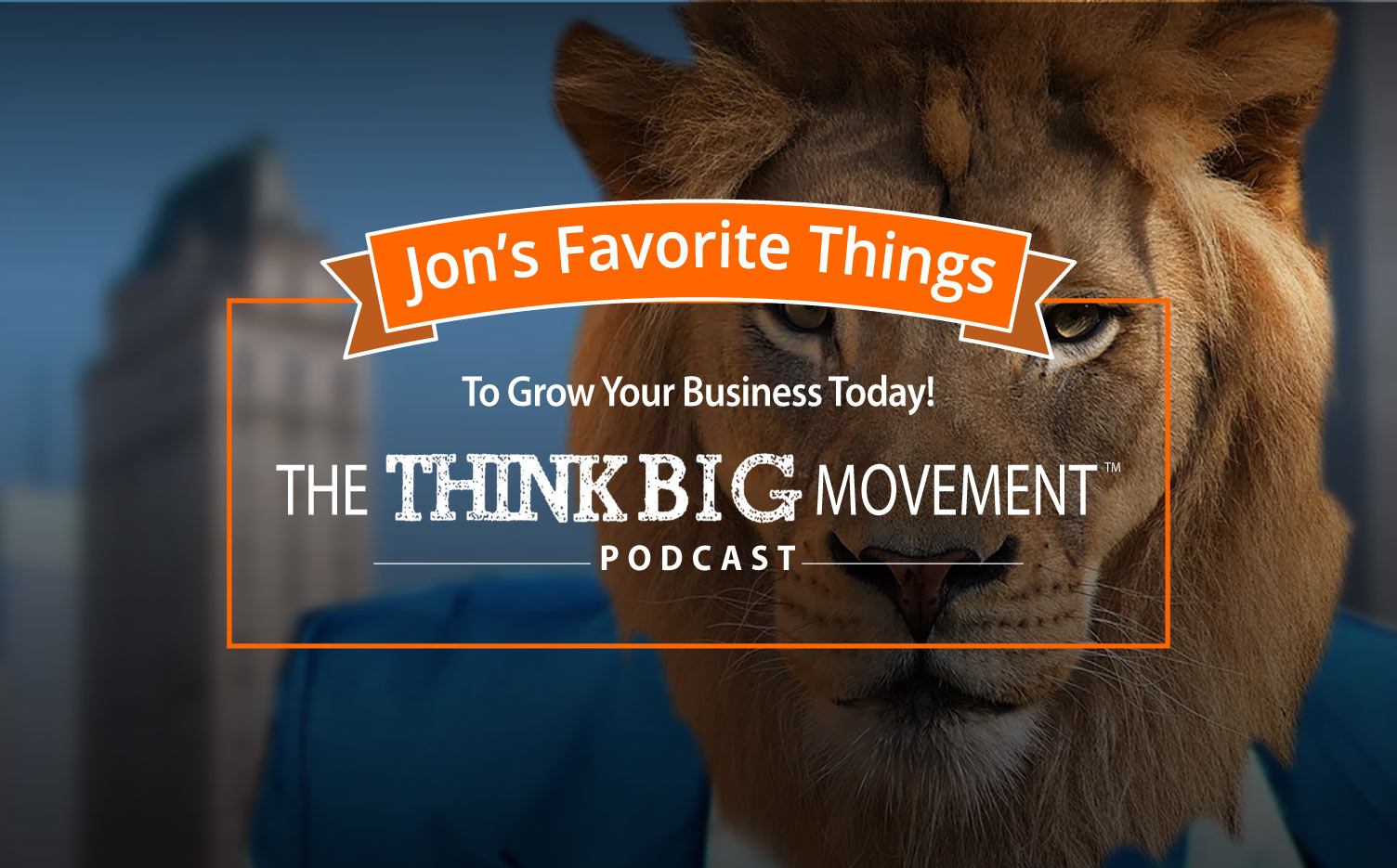
Brian S. Raznick is a partner in the Southfield office of Jaffe Raitt Heuer & Weiss. A member of the Firm’s Real Estate Group, Brian represents clients in the formation of entities and the sale and purchase of various businesses. He also represents developers and investors in acquiring, developing, financing, selling and leasing commercial and industrial real estate as well as owners of shopping centers and industrial buildings locally and nationally in lease negotiations. Brian has also represented syndicators in the formation of entities to acquire and operate manufactured home communities and office buildings.
*E – explicit language may be used in this podcast.
Read the transcript
Jon Dwoskin: Hey everybody, I’m Jon Dwoskin, an Executive Advisor and Business Coach. I work with successful business people who are stuck and want to take their company to the next level. Today though, get ready to grow your business big, very big. In just a few seconds, you’ll meet a dynamic business owner, executive sales person, willing to share the best practices that fuel their growth and success. Each interview is no more than 15-ish minutes long, so you can quickly learn effective tools to put into your business today. Please listen with new ears and let’s get to learning, let’s get to growing, and let’s get to thinking big.
Hey everybody, welcome back, and thanks for taking time to listen to this episode of the Think Big Movement Podcast. I appreciate it. Today, I’m really excited about our guest, Brian Raznick, who is a partner at the Jaffe Law Firm in Southfield, Michigan. He is one of the best real estate attorneys in the country in my humble opinion. I’m excited to have him on as a guest today. Brian, tell us about your business. Fill in the gaps. Let’s take the conversation from there.
Brian Raznick: Sure, Jon. Thanks for having me on. I’m really excited to be here. I’ve been at Jaffe for my entire career. About 20 years now. I’m on the Executive Committee of our firm. We’re about 120 lawyers. In addition to practicing, I also help oversee the entire firm. I started in real estate. A friend of mine decided to buy a commercial building. He contacted me out of the blue. I had been practicing six months. We figured out how to acquire a property together and ever since then, I’ve been doing real estate finance, acquisition, disposition, leasing, and anything that goes along with commercial real estate.
Although I’m based in Michigan, 80% of my practice actually takes place across the country. I can tell you that my services are recognized throughout the country due to the level of sophistication at which I practice, but charging local Michigan rates. We’re much cheaper than the New York, Illinois markets.
Jon Dwoskin: Let’s talk for a minute about the sophistication. I think it’s sometimes too common that people try to play their own attorney, when really most legal issues to me – and I’m not an attorney, I actually walked out of my LSATS after taking the Princeton Review – but they don’t view things as sophisticated as they should. I know you do things on a very high level. Talk a little bit about the sophistication. How should potential clients of yours or your current clients be looking at any transaction to the level of how sophisticated they should be thinking about it?
Brian Raznick: Well, I think for most people, not everyone, but many people have had an experience of buying a residential property – their single home. For the predominately 80% of those people, probably 90% don’t get attorneys involved. Most of the time, it’s not an issue, but every so often, somebody has a problem with a house they bought and they forget. They go back to the contract and it doesn’t protect them. Think about when you’re getting into the commercial field. Anything you do, seven, eight times out of 10, if you didn’t do it with an attorney or use an attorney, you may be okay, but it’s those 3 out 10 times when you want someone there to protect you and make sure that you’re addressing all the issues.
You want to make sure that when you borrow money from a bank, they can’t come back and sue you on things that you weren’t aware of. You want to make sure that, if you put up money as a deposit to buy a building, you can get it back under certain conditions. There are so many pitfalls when a real estate party who is not sophisticated goes up against a sophisticated real estate person who has an attorney. If you’re not protected, that’s when you can get burned.
My primary job when I represent anybody is to make sure they’re protected and that they’re getting the benefit of the bargain that they thought they were getting. Now, on average, a real estate purchase agreement for a building probably averages 50 to 60 pages. There are so many things that could be buried in the document that you need somebody who does this every day to tell you what you need to do to address the concerns.
Jon Dwoskin: Having been in the real estate business in a past life of mine for over a decade, it’s amazing that when people are looking at deals and underwriting deals, real estate people are always looking at the projections and forecasts of most any deal. Sometimes, they don’t maybe put as much stock into forecasting and projecting the potential unknowns, which is why they need to spend the money and the extra money on attorneys reading and reviewing and protecting them in the 40, 50, 60, 70 page document. It’s an investment, not an expense.
Brian Raznick: It should be looked at as the cost of the deal.
Jon Dwoskin: Correct.
Brian Raznick: Just like when you buy a [property]. The broker is going to get a commission, which traditionally is significantly lower than when an attorney is paid for reviewing the document. Yes, the broker adds value by finding you the property, but an attorney adds value by making sure that you don’t have any pitfalls once you go forward with the deal.
Jon Dwoskin: Right. It’s so critical and it’s great that you’re there to protect them because you’re one of the most important people on the team at that point. Let me ask you a question, Brian, just switching gears for a minute. You are a partner at Jaffe, one of the top people at the law firm, and overseeing a law firm is not an easy thing, especially when you’re growing your own book of business. I always say that business is easy, but people make it really difficult. Talk a little bit about overseeing, helping to oversee the firm, while also growing your book of business. That’s a lot of different hats to wear. What’s the secret recipe that works for you?
Brian Raznick: When I first started, I had the luck of developing a tremendous book of business at a young age. One of the reasons early on my book didn’t accelerate as quickly as it could have was I was micromanaging every aspect of every transaction that I did. One of the biggest things that I learned early on was that I needed to delegate my work to other attorneys within the firm. To do that, I had to trust those attorneys. I spent a lot of time training a lot of people to make sure that I could hand off different parts of transactions, so that I could increase my total book of business.
I actually learned that from one of the, at the time, more senior partners at the firm, and once I did that, my book of business really went to the next level and it also enabled me to get more actively involved and for management and to try to make a difference to the overall firm. It’s a fine balance, but as the firm gets bigger and stronger and we continue to hire terrific people and retain the people we already have, it’s a win-win for all parties because not only do I personally benefit, but the whole is greater than its parts.
Jon Dwoskin: You know, I love what you’re saying right there because it’s an obstacle that I think too many people fall into when they’re with a company and it’s growing because the bigger the company gets, you can’t touch everything. So you have to become a better delegator and you have to trust your team. It’s one thing to have somebody give you the feedback and give you the guidance. It’s another thing to let go and really implement and live that and let go of stuff. What was the bridge like for you to do that? How quickly did you implement that? Because, to me, I think people who are listening could really grow from that piece of advice. It is huge.
Brian Raznick: Well, again, what I would say is I took baby steps first. Well, first it was a culmination because first I had one individual that I started bringing in to help me. He would sit in on the conference calls when we would negotiate a purchase agreement. I would give him my handwritten comments to the agreement, so that he could mark it up. By doing that, it’s the Karate Kid way of learning. He would learn how to negotiate on his own. I would say it was probably about a three to six month process. Then I gave him a less sophisticated deal to do on his own. Obviously, I still pay attention. He did a terrific job. Then he started training other people to help him and I brought in somebody else. Before you knew it, there’s four to five people working directly for me, but they have two to three people each working for them. I built up a pyramid, if you will.
Jon Dwoskin: Okay, good.
Brian Raznick: Not to say that I’m still not involved and paying attention to everything because that’s not the case either. To be successful, you have to always keep your hand in the organization.
Jon Dwoskin: Yeah.
Brian Raznick: Not be cliché.
Jon Dwoskin: No, no. I know what you mean. I think it’s important when you talk about taking baby steps and allowing yourself to wean off of the micromanagement mindset and give yourself three months, six months, whatever it takes, but start the process and be committed to the process because you know the result will benefit not only you, but the people that work for you and with you. Kudos to you for making that happen because it makes life a lot easier and more fun for you as well. Brian, if there was one additional piece of advice in these last couple of minutes we have together that you wanted to share with someone, whether it’s a book, a podcast, a piece of advice, an article you’ve ever read, what would that be?
Brian Raznick: Well, the thing that I would say is, and I say it often, the key to success, there’s only two words: hard work. I read that book by Phil Knight, Shoe Dog, recently, actually. The guy who founded Nike. If you really read his book, it shows you that to get to the top, even he’s at the pinnacle of a successful company, but from day one, he was willing to do whatever it took to be a success. I think that’s what the younger generation needs to remember especially. That to be successful, there’s no substitute for hard work.
Jon Dwoskin: I couldn’t agree with you more. I’ve shared this before, when I got into the real estate business, I remember calling Rick Agri, who you and I both know, and I said to him, “Hey Rick. I’m in the real estate business.” He was in the real estate business. He still is in the real estate business. I said, “I’m in the real estate business. Any advice on how to grow my real estate business?” He said to me, “One piece of advice Jon. Just show up every day.”
What he was saying was the same thing. Show up every day, work hard, and you’ll grow your business. I did what he said. I probably would have done it if I didn’t call him, but it stuck with me and this is now 15 years later. It was just a great reminder to just show up and just work hard. I love that advice because it’s so simple, but it’s so true. Brian, tell people how they can get a hold of you and give them your name, your number. Well, they know your name, Brian Raznick, but give them your number, your website, your email, so people can get in touch.
Brian Raznick: Okay, great. My number is 248-727-1442. My email is B, as in Brian, R-A-Z-N-I-C-K @Jaffelaw.com, J-A-F-F-E law.com. Our website, you can find it under Jaffe. It comes up pretty quickly.
Jon Dwoskin: Oh, great. Well, I know what a great human being you are. I know what an outstanding real estate attorney you are firsthand and by your reputation. I know many people who do work with you. Kudos to you for just doing impeccable work. For those who are listening who need a real estate attorney, give Brian a call. Brian, I’m really appreciative and grateful that you were on the call to share some of your best practices and advice and wisdom. Thank you very much.
Brian Raznick: Oh, and Jon, thank you for all you do for my clients. I appreciate that too.
Jon Dwoskin: Yeah. My pleasure. Have a good rest of the day.
Brian Raznick: All right.
Jon Dwoskin: We’ll talk to you soon.
Brian Raznick: Okay, take care.
Jon Dwoskin: All right, thanks Brian.
Brian Raznick: Bye.



